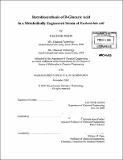Retrobiosynthesis of D-glucaric acid in a metabolically engineered strain of Escherichia coli
Author(s)
Moon, Tae Seok
DownloadFull printable version (9.834Mb)
Other Contributors
Massachusetts Institute of Technology. Dept. of Chemical Engineering.
Advisor
Kristala Jones Prather.
Terms of use
Metadata
Show full item recordAbstract
Synthetic biology is an evolving field that emphasizes synthesis more than observation which has been and is the scientific method for traditional biology. With powerful synthetic tools, synthetic biologists seek to reproduce natural behaviors (and eventually to create artificial life) from unnatural molecules or try to construct unnatural systems from interchangeable parts. Accompanied with this recent movement, metabolic engineers started to utilize these interchangeable parts (enzymes in this case) to create novel pathways. In addition, engineering biological parts including enzymes, promoters, and protein-protein interaction domains has led to productivity improvement. However, understanding behaviors of a synthetic pathway in an engineered chassis is still a daunting task, requiring global optimization. As the first step to understand pathway design rules and behaviors of synthetic pathways, a synthetic pathway for the production of D-glucaric acid has been designed and constructed in E. coli. To this end, three disparate enzymes were recruited from three different organisms, and the system perturbed by this introduction of heterologous genes was analyzed. Limiting flux through the pathway is the second recombinant step, catalyzed by myo-inositol oxygenase (MIOX), whose activity is strongly influenced by the concentration of the myo-inositol substrate. To increase the effective concentration of myo-inositol, synthetic scaffold devices were built from protein-protein interaction domains to co-recruit all three pathway enzymes in a designable complex. (cont.) This colocalization led to enhancement of MIOX activity with concomitant productivity improvement, achieving 2.7 g/L of D-glucaric acid production from 10 g/L of D-glucose input. Secondly, retrobiosynthetic approach, a product-targeted design of biological pathways, has been proposed as an alternative strategy to exploit the diversity of enzymecatalyzed reactions. The first step in a glucaric acid pathway designed retrosynthetically involves oxidation of the C-6 hydroxyl group on glucose, but no glucose oxidase in nature has been found to act on this hydroxyl group on glucose. To create glucose 6- oxidase, a computational design and experimental selection was combined with the help of DNA synthesis technology. To this end, the sequence space of candidate mutations was computationally searched, the selected sequences were combinatorially assembled, and the created library was experimentally screened and characterized. Furthermore, the structure-activity relationship of the newly created glucose oxidases was elucidated, and the kinetic model mechanism for these mutants was proposed and analyzed. Collectively, parts, devices, and chassis engineering were applied to a synthetic pathway for the production of D-glucaric acid, and this synthetic biology approach was proven to be effective for new pathway design and improvement.
Description
Thesis (Ph. D.)--Massachusetts Institute of Technology, Dept. of Chemical Engineering, February 2010. Cataloged from PDF version of thesis. Includes bibliographical references (p. 173-181).
Date issued
2010Department
Massachusetts Institute of Technology. Department of Chemical EngineeringPublisher
Massachusetts Institute of Technology
Keywords
Chemical Engineering.